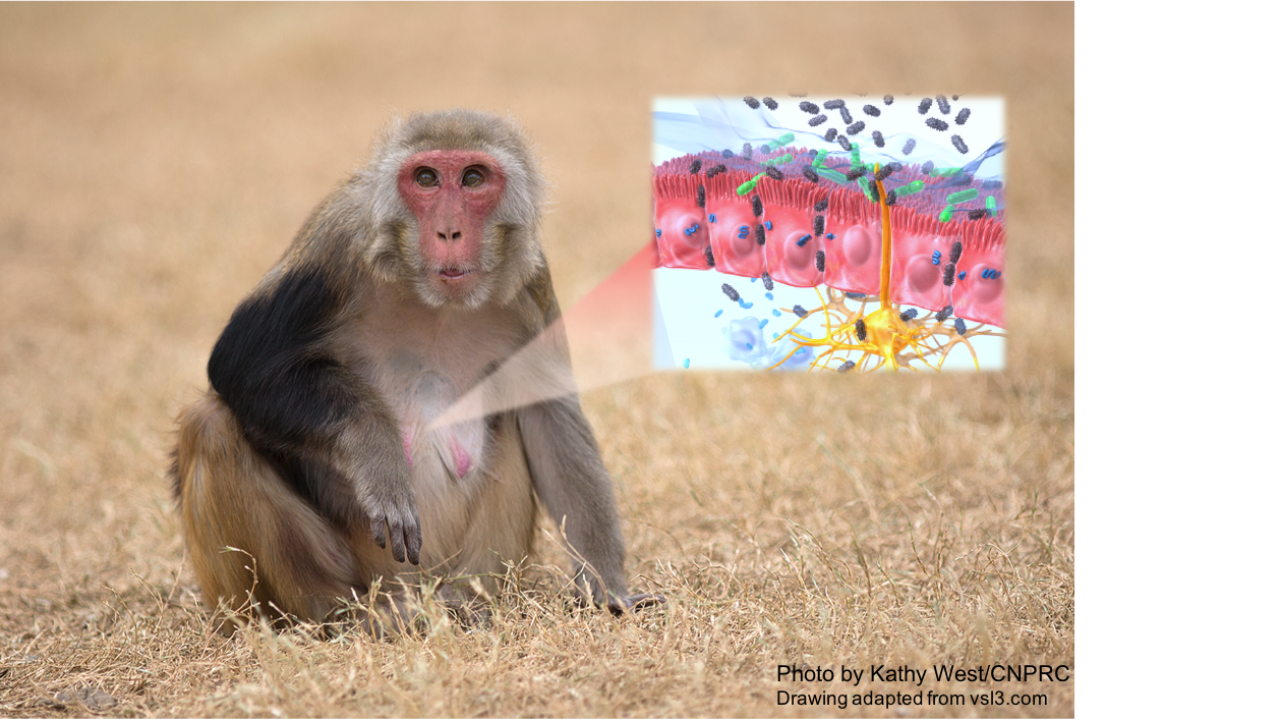
Naturally occurring monkey disorder offers insight for human intestinal disorder
A new understanding of interactions within our microbiome is revealing the elusive cause of ulcerative colitis through the study of a nonhuman primate disorder, idiopathic chronic diarrhea (ICD). ICD affects 3-5% of all captive macaque monkeys and researchers believe wild macaques could be affected at similar rates. ICD is an intestinal disease that is unresponsive to medical intervention, including antibiotics and corticosteroids, and is not caused by any particular pathogens. Monkeys with ICD here at the California National Primate Research Center (CNPRC) have become an animal model capable of providing deeper insight to ulcerative colitis.
CNPRC scientist, Dr. Amir Ardeshir first began investigating microbiome interactions in relation to intestinal diseases such as ICD in macaques and ulcerative colitis in humans when Drs. McCune and Loke, gastroenterologists and biomedical researchers at University of California San Francisco (UCSF), and New York University (NYU) approached him with an anecdote of a patient who had temporarily treated their ulcerative colitis by consuming the eggs of a parasite called Trichuris trichiura. Ardeshir followed up with this patient’s home remedy in our ICD monkeys and discovered the parasite was an effective treatment in four out of five monkeys. How could this be?
Ardeshir, in collaboration with McCune and Loke, along with other researchers from UCSF, University of Texas Southwestern, and NYU, found an interesting relationship between the Trichuris parasite and the monkeys’ microbiome. Treated monkeys had different microbial communities than healthy control subjects. The altered communities were particularly good at building the protective mucosal layer along the intestinal wall. This mucosal layer is imperative for protecting our intestinal epithelium from opportunistic pathogens.

To understand why ICD monkeys appeared incapable of maintaining a healthy mucosal layer, Ardeshir collaborated with Dr. Danielle Lemay, a molecular biologist with the UC Davis Department of Nutrition and USDA ARS Western Human Nutrition Research Center. Together they have identified some of the specific bacteria and microbial interactions occurring in cases of ICD. A new software called SAMSA2, developed by Sam Westreich in the Lemay Lab, uses a technique called metatranscriptomics. With this software the team was able to take microbiome research further than the field has gone before and shed light on how microbiome and diet can interact and prolong ICD in macaques.
The new approach not only revealed which bacteria were present in each monkey’s gut, but also provided information about what those bacteria were doing and how they might be interacting. SAMSA2 allowed Ardeshir and Lemay to see distinct differences in the functions of bacteria present in ICD monkeys compared to healthy control monkeys.
They found a dramatic increase in the number of “bacteria that are very notorious for mucin degradation”, says Ardeshir. Mucins are heavy molecules developed by epithelial cells and composed of sugar molecules linked with other compounds such as proteins or peptides. Mucins are crucial glycoproteins for the maintenance of the mucosal layer lining our intestines and without it our mucosal layer will be unable to keep and maintain a healthy relationship with the gut bacteria. In support of their findings, biopsies of human patients with ulcerative colitis exhibit dysfunctional mucosal layers, which may be the source of irritation and inflammation in both ICD and ulcerative colitis.
The exact cause of ICD and ulcerative colitis is still unclear, but Ardeshir believes this study brings the field much closer to a full understanding of bacterial interactions with the host at the site of chronic inflammation. This is very exciting for primate centers like ours who were once losing hundreds of monkeys to ICD and human patients with ulcerative colitis who have run out of treatment options. Ardeshir explains a new treatment direction, “Before you go to something like the specific antibiotic...How about if you target these mucus degrading enzymes?”. Ardeshir is still working with ICD monkeys to develop a treatment capable of correcting the bacterial imbalance through enzymatic activity.
Click here for the original publication.
Written by Logan Savidge California National Primate Research Center
